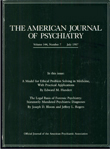Defense Mechanism Changes in Successfully Treated Patients With Obsessive-Compulsive Disorder
Abstract
OBJECTIVE: Changes in defense mechanisms after treatment of patients with obsessive-compulsive disorder (OCD) were measured by using an established rating scale. METHOD: Before and after 7-week group behavior therapy, 17 patients with DSM-III-R OCD were assessed with the Defense Style Questionnaire, Yale-Brown Obsessive Compulsive Scale, and Beck Depression Inventory. RESULTS: After behavior therapy the patients evidenced significant decreases in Yale-Brown Obsessive Compulsive Scale scores and significant increases in the use of more adaptive defense mechanisms. There were no significant changes in three maladaptive defense mechanism categories. The improvement in adaptive defenses was independently linked to improvement both in OCD and in depression. CONCLUSIONS: Personality as defined by defense mechanisms may be more amenable to brief behavioral treatment than previously thought. The permanence of these changes must be further assessed.



